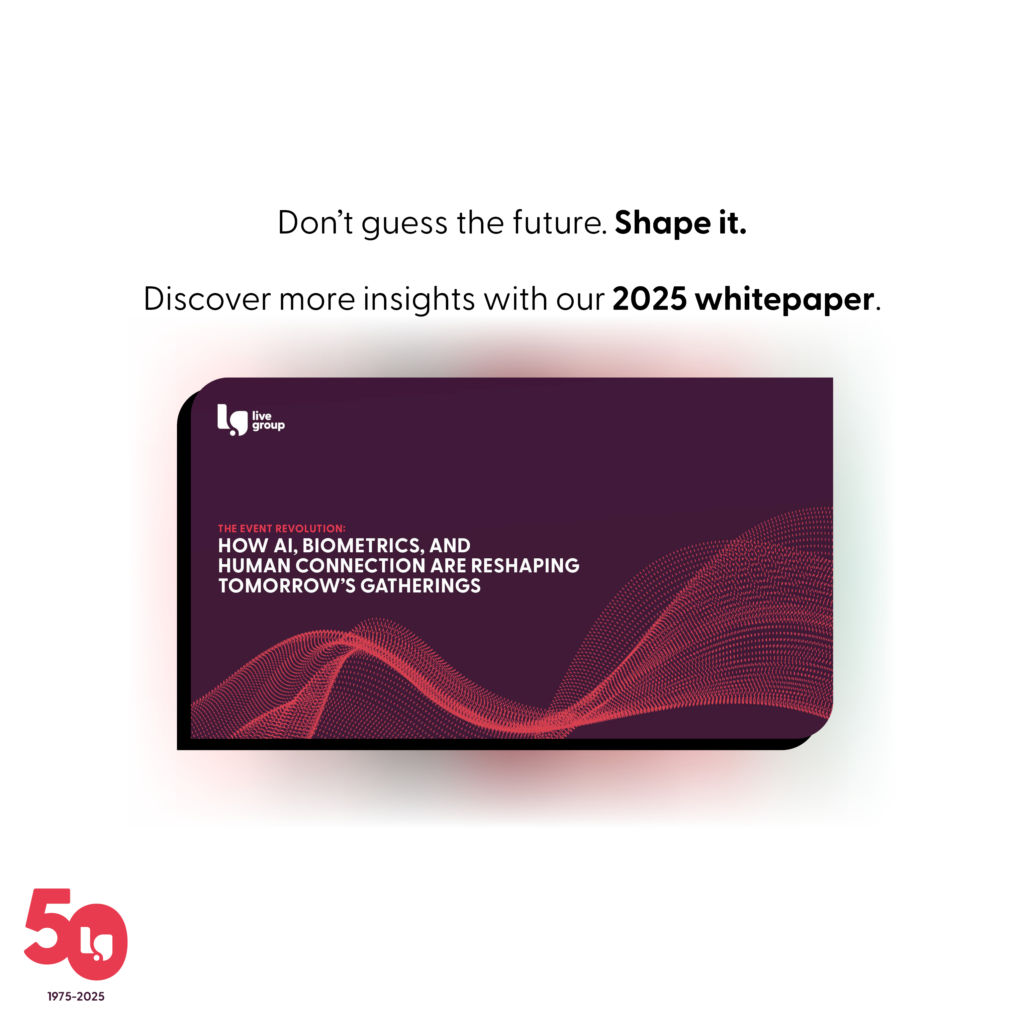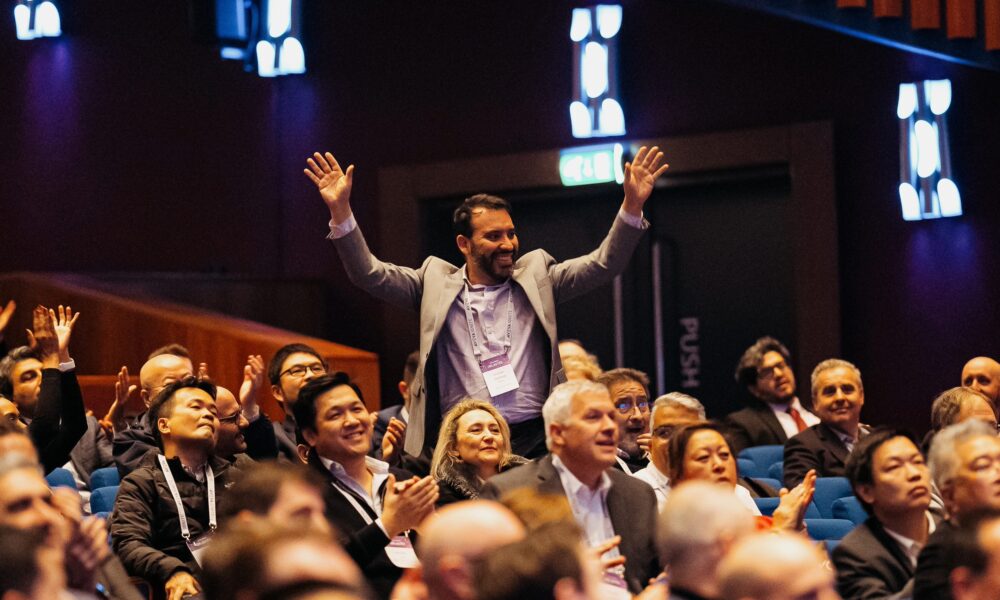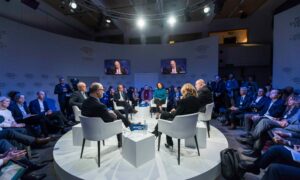Research-backed strategies for designing experiences that attendees will never forget.
What separates a conference that sparks true engagement from one that feels like an obligatory chore? It comes down to what makes an event memorable. These impressions are not accidental; they are built deliberately, using proven frameworks and methodologies.
Crafting memorable events isn’t about luck or throwing every novel idea at the wall and hoping something sticks. It relies on the thoughtful application of science, data, and creativity. By integrating emerging technologies like AI with human-centric design principles, organisers can create an event management plan to help them orchestrate unforgettable experiences that truly resonate with attendees.
In this article, we dive into the mechanisms behind creating events that stick, focusing on research-backed strategies to captivate audiences, build strong emotional connections, and leave a mark.
What Makes an Event Memorable?
While logistics and venue choices matter, what makes an event memorable is the way it makes people feel. Psychology and neuroscience reveal that memory is tied to emotional peaks, sensory immersion, and meaningful interactions. Attendees remember moments, not schedules.
Key factors that make events unforgettable include:
- Strong emotional connection
- Novelty and surprise
- Opportunities for co-creation
- Storytelling and narrative flow
- Multi-sensory experiences
- Personal relevance and customisation
When your event management plan deliberately incorporates these elements, you dramatically increase your chances of leaving a lasting impression.
Why Memorable Events Matter
The goal of any event is not just to impress but to impact. A memorable event drives deep engagement, loyalty, and advocacy, offering long-term ROI beyond the event itself. Neuroscience shows that memory is shaped by moments of heightened emotion or intensity, supported by a psychological concept known as the peak-end rule. According to this rule, people judge an experience largely based on its emotional high points and its conclusion.
By strategically crafting specific “moments” into your event and ensuring a strong finish, you can leverage this natural human tendency to create more enduring memories.
The Science of Memorable Events
Human memory is inherently selective. According to the peak-end rule, we don’t remember entire experiences; rather, we recall the highlights (or peaks) and how the experience concluded. This principle is crucial for understanding what makes an event memorable. By deliberately designing for those “peak” moments, you can ensure your event doesn’t just fade into their mental ‘event clutter’.
Dr Silvia Angeloni’s Conceptual Framework for Co-Creating Memorable Experiences highlights several core components that influence memorability. These include co-creation, novelty, theming, and storytelling, which directly impact the levels of entertainment, education, escapism, and aesthetics an event can offer.
Below, we’ll break these principles down and explore how you can implement them in your events.

Core Elements of Memorable Events
Co-Creation with Attendees
The days of passive attendees sitting quietly in a crowd are long gone. Today’s attendees want active roles in shaping their experiences. This interactive approach, called co-creation, transforms individuals from spectators to participants.
How to bring co-creation into your event:
- Personalised agendas: Use AI technology to create custom schedules based on attendees’ preferences and goals. Tools like recommendation engines can provide personalised content and activities, making each attendee feel valued.
- Interactive installations: Offer opportunities for guests to create, contribute or customise. For example, in a tech conference, attendees could design their own tech prototypes in demo workshops.
- Community discussions: Include breakout sessions or networking apps that facilitate peer collaboration and idea-sharing.
Ensuring co-creation is part of your event management plan not only enhances attendee engagement but also builds a sense of ownership, making people feel personally tied to the event.
Novelty Breeds Interest
Nothing sticks in the mind like the element of surprise. Novelty, or offering something unexpected and fresh, not only captures attention but also boosts memory retention. Including Innovative ideas, unique activities, and one-off experiences in your event management plan will make it stand out.
Examples of novelty in action:
- Unconventional spaces: Instead of a standard conference room, consider hosting your event in an open-air garden, a contemporary art gallery, or even an industrial warehouse transformed into a light installation.
- Surprise moments: Unveil a surprise musical performance or innovative tech demonstration as a climax to your event.
- Interactive tech: Use tools like augmented reality (AR) and virtual reality (VR) to create immersive and unprecedented experiences.
Remember, novelty doesn’t always mean breaking the bank. It could be as simple as integrating unexpected elements of fun, like a live illustrator capturing key moments of your panel discussion.
Theming and Storytelling: The Glue of an Experience
Memorable events with a compelling theme and story anchor attendees’ memories by connecting them emotionally to the experience. Storytelling has been used for centuries to captivate, communicate, and create meaning.
How to build immersive themes:
- Create a narrative arc: Think of your event as a story. What’s the beginning, middle, and end? How do you start with intrigue, build suspense, and finish with a powerful resolution?
- Cohesion is key: The theme should flow through all aspects of the event—from décor and materials to the style of presentations and activities.
- Personalised storytelling: Include moments where attendees can relate their own stories or feel like protagonists. AI-driven experiences can use personal data points to craft tailored narratives.
For example, an eco-summit might adopt “A Journey to a Sustainable Tomorrow” as its theme, with sessions representing stages of that imagined “journey” and outcomes tied to actionable takeaways.
Sensory Aesthetics and Atmosphere
A truly memorable event appeals to the senses. People are naturally drawn to environments that feel harmonious, inspiring, and creatively stimulating. This is where aesthetics play a key role: not just in terms of visual design but in creating a multi-sensory experience.
Sensory touchpoints to focus on:
- Visual elements: Bold lighting, branded installations, and even digital projections can make an experience visually unforgettable.
- Sound: Use curated soundscapes or live performances to enhance atmosphere and evoke emotion.
- Touch and interaction: Tactile experiences, like an interactive art wall or a DIY workshop, resonate strongly.
- Scent and taste: Whether it’s the aroma of freshly brewed coffee at a networking café or a tasting menu featuring local delicacies, these elements can leave a deep impression.
Integrating sensory appeal into your event management plan not only increases the impact of the event but also builds emotional connections, ensuring people don’t just see your event but feel it.
Escapism and Emotional Connection
Events offer attendees a valuable opportunity to escape their everyday routine. By crafting moments of escapism, you can create powerful emotions that act as anchors for memory.
Designing shared escapes:
- Immersive environments: Transport your audience with atmospherically designed spaces, such as recreating historical settings or futuristic worlds.
- Cultural engagement: Celebrate the local culture by incorporating authentic elements, like traditional performances or cuisine, to immerse attendees in something beyond their ordinary.
- Human connection: Connection is one of the most powerful forms of escapism. Facilitate meaningful networking through smart matchmaking tools or structured conversations.
By creating these moments of escapism, attendees’ focus shifts entirely to the experience at hand, forging long-lasting emotional connections with your event.
Measuring Success and Retaining Momentum
Designing a memorable event is only the start. To ensure your event continues to inspire and foster engagement long after its conclusion, don’t forget the post-event phase.
Actionable tips for post-event success:
- Follow-ups with a purpose: Send personalised thank-you notes or post-event summaries with highlights and next steps.
- Keep attendees engaged: Introduce an exclusive online community for networking or continued discussions.
- Capture and share memories: Use engaging formats like photo slideshows, recap videos, and attendee testimonials to relive those peak-end moments.
Events are journeys, and just like any good story, they should leave people reflecting, learning, and wanting more.
Moving Beyond the Event
The impact of your event doesn’t end when the last speaker leaves the stage. Use the period post-event to reinforce the shared experiences attendees are likely to recall.
- Send out dynamic follow-ups that recap key moments tailored to each attendee.
- Build an online community for participants to share photos, testimonials, and feedback.
- Analyse attendance data for deeper insights to refine future events.
Google, for instance, often integrates post-event surveys with AI-generated automated analyses, which help organisers see what resonated most and optimise next steps.
How to Create Memorable Events
Crafting events that stick involves balancing inspiring creativity with advanced tools like AI for personalisation and logistics. Developing memorable, impactful experiences might take extra effort, but the results are worth it. You’ll strengthen relationships, elevate your brand, and differentiate yourself in a saturated market.
Download our latest report to explore the latest event solutions, learn how event production agencies are leveraging technology for seamless conference planning, and uncover strategies to enhance hybrid event management.






